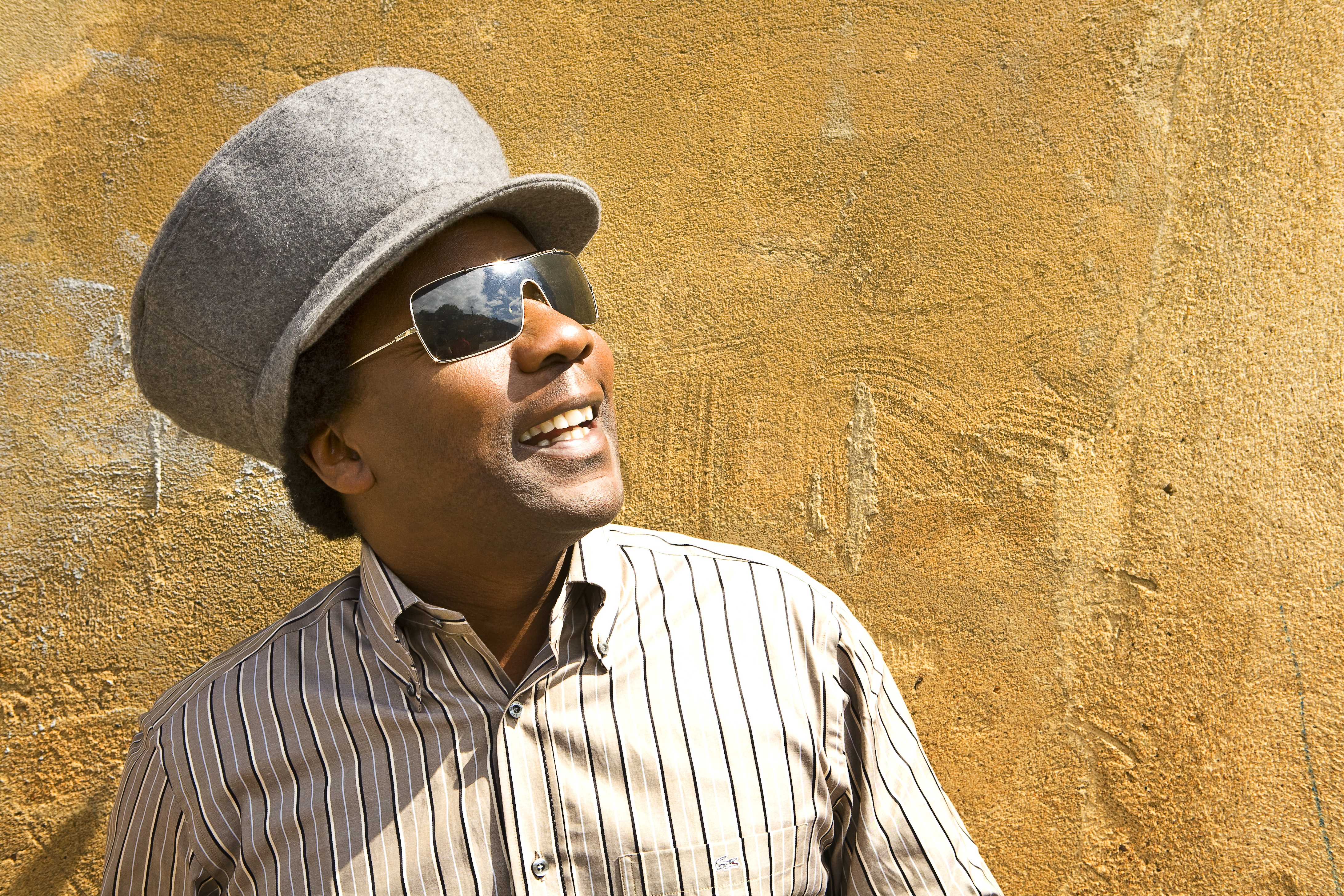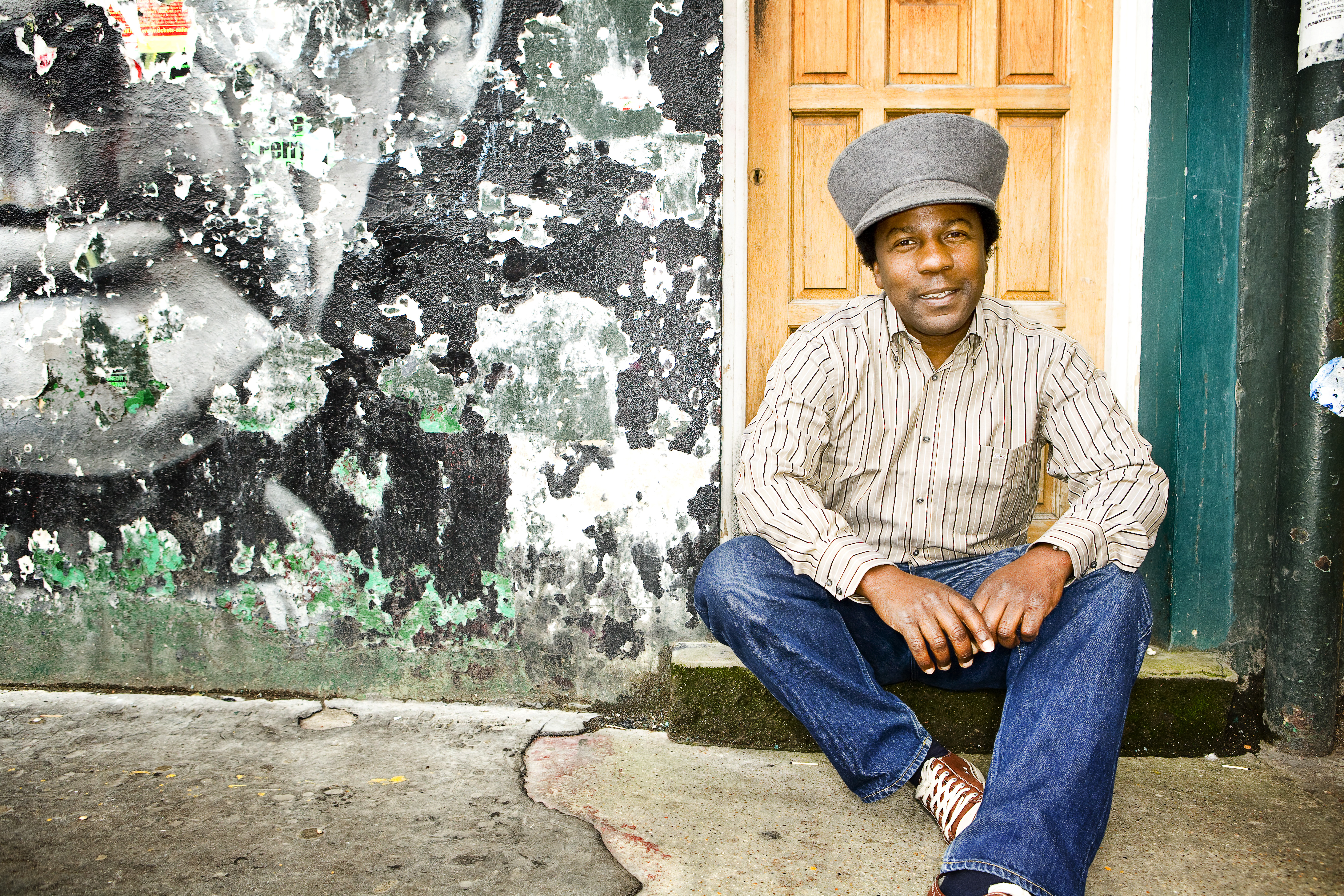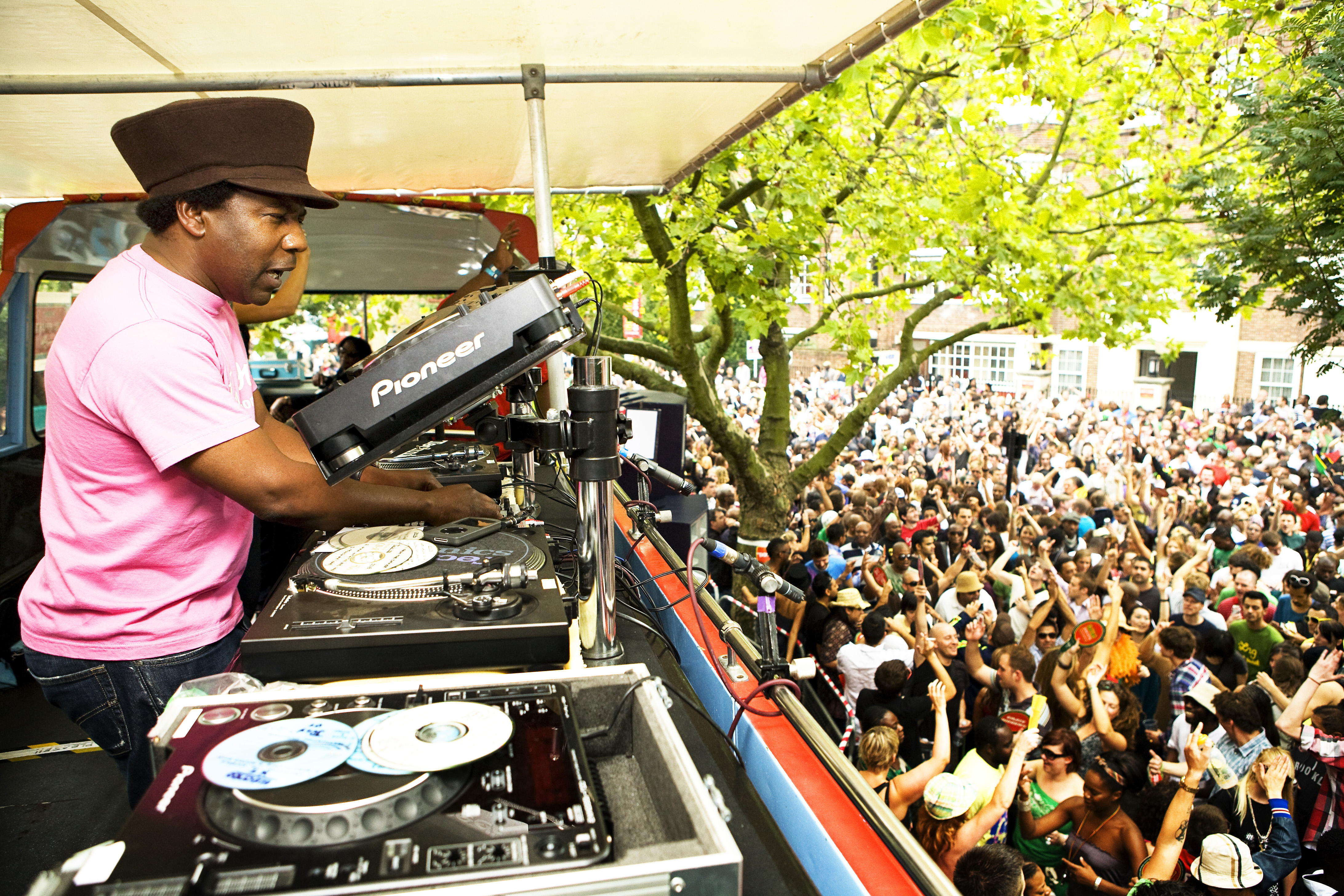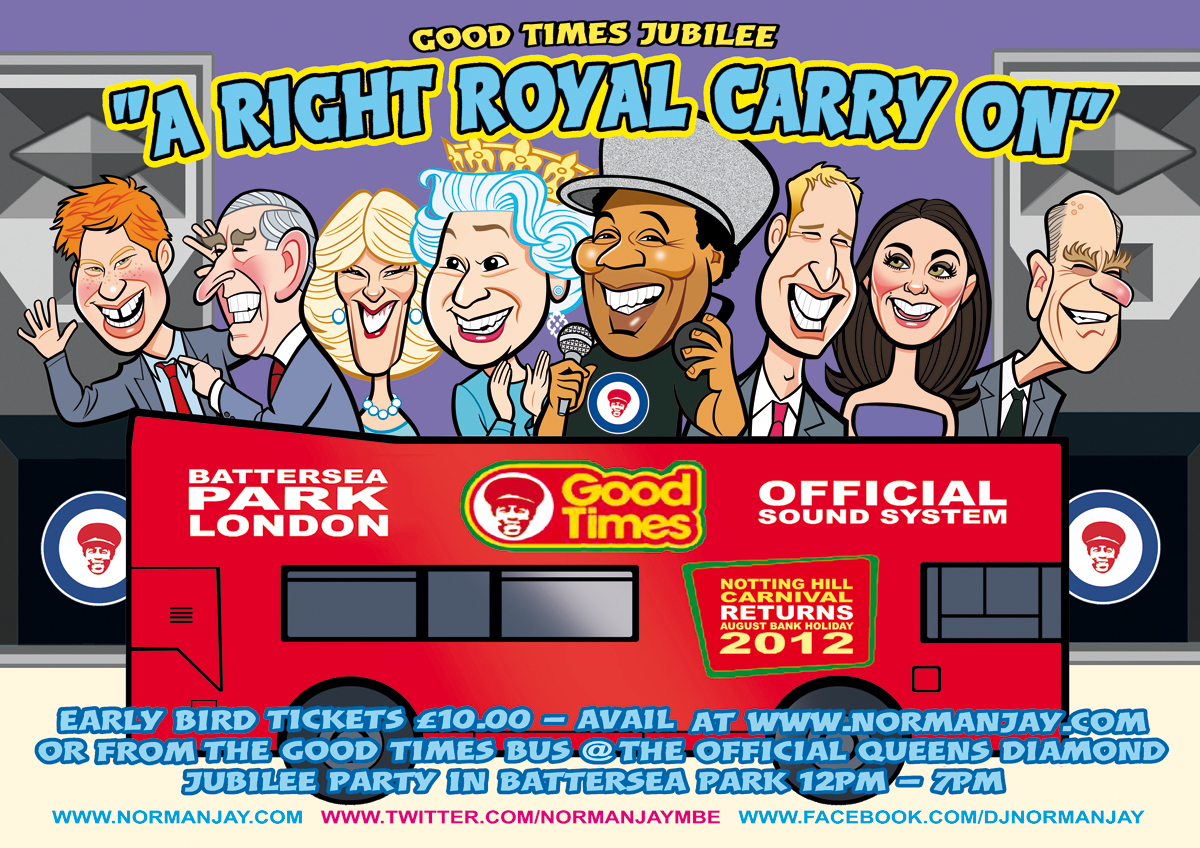Commonly known as ‘The deejay’s DJ’ by his peers and huge fan base alike, Norman Jay is showing no signs of slowing down. With over three decades spent as a highly respected DJ, radio presenter, label owner and all round musical ambassador, he continues to both educate and rock the dance floor with an eclectic mix of funk, jazz-funk, soul, disco and house.
By playing for the crowds and not to them, ensuring that ‘good times’ are had by all, it’s the latter that forms an underlying mission statement for what Norman Jay truly stands for, and has managed to achieve with great success. Rewind the tape back thirty years to an inspirational trip to New York in the late 70s, where he played at his first ever ‘block party’. Upon returning to the UK, Jay decided to set up his own sound system with brother Joey appropriately named The Good Times Sound System.
Possessing a burning desire to play at The Notting Hill Carnival, this came to fruition in 1980 with their first ever appearance after an initial backlash from other sound systems due to the chosen music policy. Fast-forward thirty years and Good Times is now one of the most famous attractions of the carnival, with thousands of revellers turning up each year to dance in front of the iconic red double-decker bus on the Corner of West Row and Southern Row in Ladbroke Grove.
“It seems that Norman Jay was always destined to become a great DJ. At just 8 years of age he was already playing records in front of his parents and his first gig was for a cousin’s tenth birthday party”
After spending most of his youth collecting vinyl and having particular musical sway to the Afro-American sounds of Motown, Atlantic, Stax and ‘The sound of Philadelphia’, he found himself taking further trips to New York, digesting the fresh sounds of disco and later the emerging rap/electro scene out of the South Bronx. Back on home-turf he was starting to attract thousands of partygoers to his huge, yet illegal, warehouse parties, which caught the attention of fellow DJ and old friend Gordon Mac. Together they started up the legendary pirate radio station Kiss FM, which included other would-be household names such as Coldcut, Jazzie B, Danny Rampling and Giles Peterson.
It was here that Norman first coined the phrase ‘rare groove’ and was affectionately known by his peers as ‘The Godfather’. When the station finally became legal in the 90s, Norman played the first ever set and with Giles and they went on to start up Talkin Loud, a pivotal label of the decade showcasing a blend of funk, soul, jazz and dance music.
The global rise of the DJ during that decade meant a plethora of international gigs, tours and festivals while still maintaining a loyal following in the UK. In the latter part, he hosted another radio show entitled Giant 45on BBC Radio London which lasted for over ten years, managing to attract a new, younger generation of fans.
“After continuing to show passion and dedication to his craft with a refusal to restrict himself to one type of genre, the tireless work did not go undeterred; in 2002 Norman Jay was awarded an MBE by the Queen for services to deejaying and music.”
During the last decade, Norman Jay has become DJ of choice for the celebrity set having played for the likes of Robert De Niro, Will Smith and Mick Jagger. He is frequently asked to play at film premieres, fashion shows and other big corporate events. This man wears many hats of course; there’s the Good Times film, the style icon, a string of critically acclaimed music compilations and a true voice for black music with regular appearances on TV and other such media.
Norman, you’re doing a special after party for the Queen’s Diamond Jubilee at the Clapham Grand in June as well as a daytime session from the Good Times party bus, tell us more about that?
Yes, on Sunday June 3rd I’ll be driving our infamous red party bus into a small plot in Battersea Park, London. We’ll be playing in a small dance arena with other bands and performing artists in order to celebrate 60 years of the Queen’s reign, also British culture in general. The event will start mid-afternoon until early evening. Hopefully I haven’t run out of credits and the man upstairs will provide some decent weather! Guests are still to be confirmed but I can say that Graeme Park will be joining me so far. Then in the evening, it’s off to The Clapham Grand for A Right Royal Carry On, well just an excuse to party really; more special guests will be announced nearer the time.
The Good times sound system wasn’t at the Notting Hill Carnival last year but will be there this year. You’ve been at the carnival for more than 3 decades, any particular favourite moments you’d care to share with us?
It’s important to understand that the organisation for the carnival is immense, much more than most people realise, so we decided to take a hiatus and recharge our batteries last year. We have our finite space there however and Good Times is the biggest major attraction, which has been confirmed by both the Council and Police. The numbers were also noticeably lower last year because of our absence and partly due to the London riots. I’m delighted to say we will be back this year in West Row. We’ve occupied that spot since 1991 and there have been some major moments indeed.
It’s difficult to single out one favourite moment, as each year seems to surpass the previous in regard to atmosphere and excitement. 2002 stands out particularly as that was the year I received my MBE; the crowd really celebrated the special occasion with me. I also remember one year when the heavens well and truly opened up, there were loud cheers from the crowd then some of the boys started throwing off their shirts and waving them around. The girls followed suite with some even taking off their bras, waving them in the air and tossing them up to the bus; a surreal experience!
Having been around for such a long time, no doubt you’ve seen many changes. How do you feel the music has changed over the years?
Well, in this rapid move toward new technology, downloads and digital platforms such as iTunes etc, there now seems to be more emphasis on electronic music. I love all types of music and contrary to the old cliché that there are two types of music – good and bad; that’s not strictly true in my opinion. The two types of music now are digital and analogue with good and bad examples of both obviously. I don’t play records much these days, purely out of choice but I’m not a slave to the internet or download culture either. I still use CDs, occasionally a laptop, but I don’t get intimidated by modern technology, it’s just a case of re-inventing the wheel which is still round by the way.
At the moment I really like the DJ mash-ups. I don’t follow individual artists much these days, especially on those so-called talent shows; there is no real interest for me. I like the new cutting edge DJ tools that are now available especially for the more cutting edge music such as drum and bass or dub step. For the party vibes there’s soul, funk, disco, house and northern soul. These genres have stood the test of time; people love them and I still love playing them – the best of the new and the best of the old.
You are an extremely successful DJ. What do you think is the key to this success? What can an aspiring DJ learn from you?
If the criteria for being a great DJ were still the same when I started, I’d write a book and give DJ lessons but the advent of modern technology has changed things. I don’t know what advice I could give, as I’m not too savvy with computers or other toys that many modern DJs may use. For me, it’s all about what comes out of the speakers and how I choose to deliver it. My focus is on the people – the crowd and trying to ensure they have the best possible time.
If the music policy is not working, I’ll play something else. From my observations some of the modern DJs get locked into their own genre, say house for example. He or She will continue to play that style even when his or her crowd may not be enjoying it because they don’t have the ability or maybe the courage to change it. For me, I can play two hours of house if I feel the crowd wants it or I’ll play two hours of hip-hop and drum and bass. I come from an era where one DJ was capable of playing most of the styles for most of the people, most of the time. A ten hour set from me would cover a huge cross-section of music, not just 10 hours of house all night long.
You released a 30 year anniversary Good Times special last year. How did the Good Times Sound System get started? What is the ethos behind it?
It does exactly what is says on the tin, simple. It’s a celebration of men and women having a good time. It was formed through the winter of discontent in 1979, Chic came out with the record Good Times and it lifted everybody’s spirits when they really did need lifting. I named the sound system after the title and the ethos is about living for the weekend. I always played records with the word ‘weekend’, ‘Saturday’ or ‘party’ in the song. These celebratory records represented escapism, dancing, brighter days ahead or some encouraged you to ‘free your mind’ – all feel good music, that’s where my head has always been. Our Good Timescompilations have been very successful also and there will be the next installment coming out later this summer.
You’ve hosted a myriad of legendary radio shows for such stations such as the original Kiss FM and your Giant 45 show for BBC London. Can we expect a return to radio this year?
I’m not sure about this year but perhaps sometime in the near future, if the right opportunity arose. That said, I think there would be a little bit of reservation simply because of the way people listen to music now. I don’t know if a static radio show would work for me. Podcasting would make more sense because people are able listen to music when it is convenient for them. It’s actually worked out better not being on the radio as it means access to me is limited and my gigs are now are always full.
You’ve toured the world, made a film and released a string of successful compilations as well as being the DJ of choice for many a well-known celebrity. Can you tell us a particular highlight or fond memory?
I’ve been very fortunate and blessed in my career; the diversity has been great for me. I’ve played at parties for showbiz celebrities and they’ve been OK. I look at those as the icing on the cake as it was never an ambition to become property of the celeb class nor did I aspire to be in that fame or profile. I played at one of the inaugural parties for President Obama in Washington and I’ve hosted the after party for the World Economic Forum over the past few years. I‘ve also played at various trade fairs around the world from Japan to Brazil. I’m still equally happy to play at small clubs and festivals; variety is the spice of life. It’s true to say that not every DJ is capable of doing such variety. On one occasion I played for the British Ambassador to Japan at a trade fair in Tokyo. I played a classical music set that went down extremely well with some orchestral delights, which I happen to like myself. The next minute I was ‘banging out’ electronic music at a festival for 2000 kids who were going for it; I love it and it’s all good.
You received an MBE for services to music as well as a host of other accolades but is there anything special that you’d like to achieve in 2012?
Professionally no, because I never aspired to achieve any honour bestowed upon me but I’m truly grateful of all the professional acknowledgments that I have received during my career. I’ve never been an ambitious person that sets out a list of goals – “I must achieve this by then” or “I must do this by then”. For me, I like the randomness, which is probably down to that bit of punk rock in me.
My life is like a continual disco mix; having fun, meeting great people, being exposed to different cultures around the world and from that point I’m truly grateful. I wake every morning and say a prayer; I never take my position for granted. I have close friends who’ve had their homes repossessed and another two friends who are suffering from cancer; this puts my life in perspective somewhat. I look at myself as a medieval minstrel, someone who performs for a few coppers in a castle, gets well fed then moves on to the next one. I’m just a modern day version of that.
Can you tell us a few of your favourite tracks that have proved to be pivotal music moments for you as a DJ and general music lover?
My love of Black Music began in the 60s. I loved ska, reggae, general 60s music, girly groups and northern soul. It’s just a name though and I’m much more interested in the sound. I‘ve been an instrumental player in club culture for a long time so it’s very hard to pick a pivotal record in my collection as they all are!
I’m trying to think of one as I speak. Smokey Robinson’s Tears of a Clown comes to mind, which to me signaled the end of the mod era and the beginnings of the reggae loving skinheads. I loved the fully international music catalogue from the early 70s particularly Ghetto Child by The Detroit Spinners with its poignant lyrics, as they were singing about me. Then there’s Marvin Gaye and Bob Marley especiallyRedemption Song. I loved a lot of white groups too, Small Faces for example.
What else do you have planned for 2012?
Plenty of festival gigs over the summer including a few parties for the 2012 Olympics and a lot of travelling. I’ll be back at the Love Box Festival in London this year and I’m also definitely going to revive my warehouse party Shake and Finger Pop in collaboration with Eddie Pillar from Acid Jazz. We are going to do a proper 60s mod/funk/jazz-funk night for all the scooter heads and mods out there…
Many thanks and respect to Norman Jay for the interview
Written for Glow Magazine Summer 2012.
Read the orginal article by clicking the link below:
http://www.glowmagazine.me/an-interview-with-dj-norman-jay-mbe/
© 2013 Pete Rann




